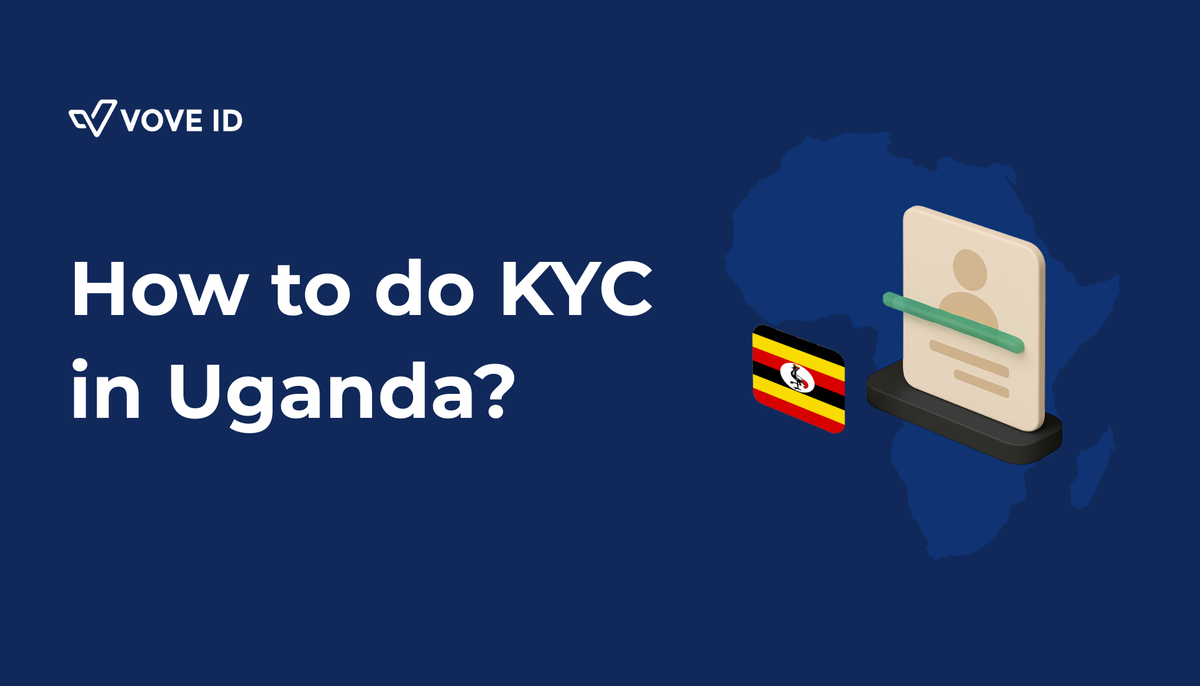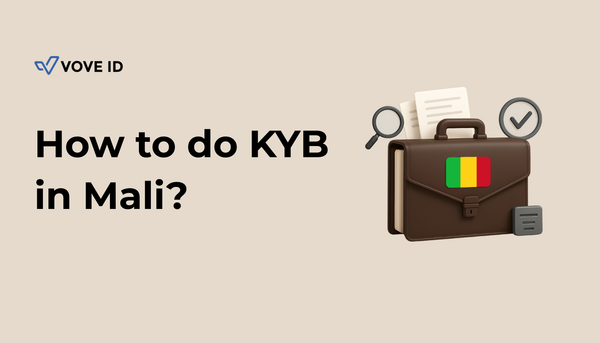KYC Compliance in Uganda: A 2025 Guide for Fintechs and Regulated Businesses
Explore Uganda’s 2025 KYC and eKYC framework, key regulators like FIA, BoU, and NIRA, challenges in rural ID verification, and how VOVE ID’s AI-powered API solutions integrate seamlessly with banking and fintech platforms for full compliance.

The Rising Importance of KYC in Uganda
As Uganda’s fintech ecosystem evolves, digital verification platforms like VOVE ID are transforming how financial institutions meet KYC (Know Your Customer) and AML (Anti-Money Laundering) obligations.
In 2025, as Uganda continues its push for financial inclusion, robust electronic KYC (eKYC) frameworks are helping institutions onboard customers securely and at scale. Fintechs, digital lenders, and banks are increasingly leveraging AI-driven identity verification to meet Financial Intelligence Authority (FIA) and Bank of Uganda (BoU) regulations while improving user experience.
Regulatory Framework: FIA, BoU, and the AML Act
KYC compliance in Uganda is defined by the Anti-Money Laundering Act (2013), updated in 2023 to strengthen digital verification. The FIA is the national regulator responsible for enforcing AML and Customer Due Diligence (CDD) obligations.
The Bank of Uganda (BoU) supervises banks, microfinance institutions, and fintechs to ensure KYC procedures align with national and international standards, particularly those of the Financial Action Task Force (FATF).
The National Identification and Registration Authority (NIRA) underpins the eKYC ecosystem by maintaining Uganda’s National ID Register, which enables real-time identity validation. Through authorized API access, licensed institutions can cross-check ID data directly against NIRA’s secure database — an essential tool for digital onboarding.
The KYC Process in Uganda
The KYC process in Uganda follows a structured CDD approach designed to protect institutions and customers from financial crime.
- Customer Identification:
Institutions collect personal data — name, national ID, date of birth, and address. For foreigners, a valid passport and residence permit are required. - Verification:
Data is validated through NIRA’s digital ID verification platform or other government-approved sources. - Risk Profiling:
Customers are classified as low, medium, or high risk, with enhanced due diligence applied for politically exposed persons (PEPs) or high-volume transactions. - Ongoing Monitoring:
Continuous transaction review helps detect suspicious activity and ensures compliance with FIA reporting standards.
By integrating eKYC tools, many fintechs and banks now perform these steps digitally, accelerating onboarding while ensuring full compliance.
Digital Transformation: eKYC and Biometric Verification
Uganda’s shift toward eKYC and biometric authentication has made identity verification faster and more secure. Facial recognition, fingerprints, and document scanning are now common in mobile onboarding journeys.
Over 70% of financial service providers have adopted digital KYC tools, integrating them with apps, web platforms, and in-branch systems. This marks a major shift from paper-based methods to API-driven, real-time verification that enhances both compliance and customer convenience.
Key Challenges in Implementing KYC in Uganda
While progress has been significant, Uganda’s KYC ecosystem still faces infrastructure and operational barriers.
- Limited ID access:
Around 25% of Ugandans, especially in rural districts, remain without valid national IDs, according to World Bank data. This complicates onboarding for microfinance institutions and mobile money agents who depend on ID-based verification. - Connectivity issues:
Many rural areas still experience weak internet coverage, restricting access to online verification systems. However, government and private sector initiatives are addressing this:- The National Backbone Infrastructure (NBI) project is expanding fiber connectivity to underserved regions.
- Partnerships with telecoms like MTN Uganda and Airtel aim to extend 4G and 5G access to enable digital banking and KYC.
- The Financial Inclusion Strategy (2023–2027) promotes digital identity adoption through NIRA’s mobile enrollment programs.
- Fragmented data systems:
Integration between NIRA, BoU, and fintech databases remains uneven, slowing real-time validation. Ongoing efforts to establish centralized API gateways are helping streamline data sharing across the ecosystem. - Compliance capacity:
Early-stage fintechs often lack resources for dedicated compliance engineering, making partnerships with RegTech providers essential.
These challenges highlight the importance of collaborative solutions — combining public infrastructure, regulatory modernization, and private innovation.
How VOVE ID Supports Digital KYC Compliance
VOVE ID provides a unified, AI-driven identity verification platform designed to help Ugandan businesses stay compliant with FIA, BoU, and AML requirements.
VOVE ID enables instant identity validation with precision and scalability.
Key Technical Features:
- Seamless integration:
VOVE ID provides APIs and SDKs for integration with banking systems, fintech platforms, or mobile apps, allowing verification processes to be embedded directly into onboarding screens for faster user checks. - AI and machine learning:
The platform uses machine learning and biometric verification to improve identity accuracy and help reduce fraud risk. - Automated decisioning:
VOVE ID delivers verification reports and data analysis results that businesses can use within their own risk assessment and approval processes. - Scalable deployment:
The service is designed to scale, with APIs that can be deployed in cloud or on-premise environments, supporting data security and regulatory compliance.
By integrating these tools, financial institutions can reduce onboarding time from days to minutes while maintaining full compliance under FIA supervision.
Uganda has over 33 million active mobile money accounts, representing more than 50% of all digital financial transactions in the country. This makes mobile money providers key players in the national KYC framework.
❓ Frequently Asked Questions (FAQ)
1. Who regulates KYC compliance in Uganda?
The Financial Intelligence Authority (FIA) and Bank of Uganda (BoU) oversee KYC regulations, while NIRA supports digital identity verification through its national ID register.
2. Is eKYC legal in Uganda?
Yes. The AML Act (2013) and its 2023 amendments formally recognize electronic KYC (eKYC) as a legitimate verification method for regulated institutions.
3. What happens if an institution fails to comply with KYC requirements?
Non-compliance can lead to heavy fines, license suspension, or criminal prosecution under the AML Act and FIA guidelines.
Conclusion
As Uganda’s financial industry embraces digitization, KYC and eKYC compliance remain fundamental to trust, transparency, and inclusion. Regulatory authorities like the FIA, BoU, and NIRA continue to strengthen frameworks that balance innovation with accountability.
With partners like VOVE ID, institutions can achieve faster, safer, and fully compliant onboarding — integrating AI, APIs, and biometrics into their platforms to support Uganda’s journey toward a secure digital economy.
Get started with VOVE ID today to streamline your onboarding, improve risk management, and ensure regulatory compliance effortlessly.




